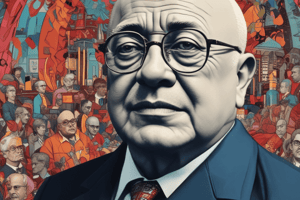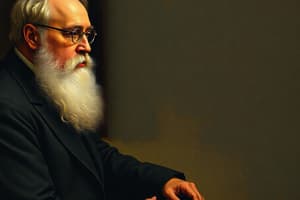Podcast
Questions and Answers
What was Adorno's contribution to Thomas Mann's novel Doctor Faustus?
What was Adorno's contribution to Thomas Mann's novel Doctor Faustus?
- Adorno wrote the novel with Mann
- Adorno provided the musical background for the novel (correct)
- Adorno edited the final version of the novel
- Adorno wrote an introduction to the novel
What was the subject matter of Adorno's joint work with Max Horkheimer, Dialectic of Enlightenment?
What was the subject matter of Adorno's joint work with Max Horkheimer, Dialectic of Enlightenment?
- The destructive aspects of progress and rationality (correct)
- The role of religion in modern society
- The importance of individual autonomy
- The positive effects of progress and rationality
What was Adorno's view on jazz and popular music?
What was Adorno's view on jazz and popular music?
- He believed it was an important form of expression for marginalized communities
- He believed it was part of the culture industry that contributed to the sustainability of capitalism (correct)
- He believed it was a tool for political resistance
- He believed it was a valuable art form that should be celebrated
What was Adorno's contribution to the Princeton Radio Project in New York?
What was Adorno's contribution to the Princeton Radio Project in New York?
What was Adorno's view on the literary climate in Germany after Hitler's rule?
What was Adorno's view on the literary climate in Germany after Hitler's rule?
What was Adorno's critique of post-war German culture directed against?
What was Adorno's critique of post-war German culture directed against?
What was Adorno's contribution to the study of fascism?
What was Adorno's contribution to the study of fascism?
What was Adorno's view on the unity of theory and praxis advocated by students during the student protests?
What was Adorno's view on the unity of theory and praxis advocated by students during the student protests?
What was the subject matter of Adorno's posthumously published work, Aesthetic Theory?
What was the subject matter of Adorno's posthumously published work, Aesthetic Theory?
Flashcards
Theodor W. Adorno
Theodor W. Adorno
A prominent German philosopher, sociologist, musicologist, and composer who was a key member of the Frankfurt School of critical theory. His works centered on themes of critical theory, fascism, culture industry, and the relationship between music and society.
Frankfurt School
Frankfurt School
A group of intellectuals based in Frankfurt, Germany, who developed a critical analysis of society, culture, and politics. They emphasized the influence of economic and social structures on individual behavior and culture, critiquing capitalism, fascism, and consumerism.
Negative Dialectics
Negative Dialectics
Adorno's theory that opposes the traditional Hegelian dialectic by emphasizing the non-identical, the incommensurable, and the irreducible uniqueness of each phenomenon. It underscores the limitations of reason and the need for a critical engagement with the world.
Culture Industry
Culture Industry
Signup and view all the flashcards
Authoritarian Personality
Authoritarian Personality
Signup and view all the flashcards
Reification
Reification
Signup and view all the flashcards
Adorno's critique of Popular Music
Adorno's critique of Popular Music
Signup and view all the flashcards
Second Viennese School
Second Viennese School
Signup and view all the flashcards
Aesthetic Theory
Aesthetic Theory
Signup and view all the flashcards
Study Notes
Theodor W. Adorno was a German philosopher, sociologist, psychologist, musicologist, and composer, born in Frankfurt in 1903. He was a leading member of the Frankfurt School of critical theory, whose work has come to be associated with thinkers such as Ernst Bloch, Walter Benjamin, Max Horkheimer, Erich Fromm, and Herbert Marcuse. Adorno's writings on fascism and the culture industry strongly influenced the European New Left. He advanced a dialectical conception of natural history that critiqued the twin temptations of ontology and empiricism through studies of Kierkegaard and Husserl. Adorno's commitment to avant-garde music formed the backdrop of his subsequent writings and led to his collaboration with Thomas Mann on the latter's novel Doctor Faustus. Working for the newly relocated Institute for Social Research, Adorno collaborated on influential studies of authoritarianism, antisemitism, and propaganda that would later serve as models for sociological studies the Institute carried out in post-war Germany. Adorno was involved in the reconstitution of German intellectual life through debates with Karl Popper on the limitations of positivist science, critiques of Heidegger's language of authenticity, and continued interventions into matters of public policy. Adorno's posthumously published Aesthetic Theory is the culmination of a lifelong commitment to modern art which attempts to revoke the "fatal separation" of feeling and understanding long demanded by the history of philosophy and explode the privilege aesthetics accords to content over form and contemplation over immersion.The Life and Work of Theodor Adorno
-
Adorno was a German philosopher and sociologist born in 1903 who was a member of the Frankfurt School.
-
He began his career as a music critic and composer, but his work was disrupted by the rise of the Nazi party, which led to his exile in 1934.
-
Adorno spent time in Oxford, New York, and Los Angeles during his exile, where he continued to write on music and philosophy.
-
He worked on the Princeton Radio Project in New York, where he analyzed the effects of music on the radio and developed a critique of the culture industry.
-
Adorno's joint work with Max Horkheimer, Dialectic of Enlightenment, was published in 1944 and dealt with the destructive aspects of progress and rationality.
-
After the war, Adorno returned to Frankfurt University to teach and became a critic of Heideggerian philosophy and a partisan of critical sociology.
-
He produced a series of influential works on fascism, such as The Authoritarian Personality, which described psychological fascist traits.
-
Adorno's work remains highly discussed and debated in sociology and philosophy.
-
He was also a composer and wrote several compositions, including Four Songs for Voice and Piano by Stefan George, op.7, and Three Choruses for Female Voices from the Poems of Theodor Däubler, op. 8.
-
Adorno died in 1969, twenty years after his return to Germany, and contributed to the intellectual foundations of the Federal Republic.
-
He was critical of the literary climate in Germany, which was dominated by writers who had remained in Germany during Hitler's rule.
-
Adorno's work helped lay the foundations for what would come to be known as "The Frankfurt School."The Life and Work of Theodor Adorno
-
Adorno wrote an influential essay on fascist propaganda and its exploitation of psychology.
-
He participated in a group experiment that revealed residual National Socialist attitudes among Germans.
-
Adorno became a public figure through his books, essays, and appearances on radio and newspapers.
-
He was involved in the Darmstadt Summer Courses for New Music and had conflicts with the so-called Darmstadt school of composers.
-
Adorno struck up relationships with contemporary German-language poets such as Paul Celan and Ingeborg Bachmann.
-
Adorno became chairman of the German Sociological Society and presided over two important conferences.
-
His critique of post-war German culture was directed against the pathos that had grown around Heideggerianism.
-
Adorno completed Negative Dialectics in 1966 and offered regular philosophy seminars to discuss the book's chapters.
-
Student protests fragilized West German democracy, and Adorno became an object of the students' ire.
-
Adorno rejected the unity of theory and praxis advocated by students and argued that their actions were premised upon a mistaken analysis of the situation.
-
Adorno began writing an introduction to a collection of poetry by Rudolf Borchardt and worked on Aesthetic Theory.
-
Adorno returned to Zermatt in 1969 after disruptions to his lectures and continued to resist blanket condemnations of the protest movement.Adorno was a member of the Frankfurt School, influenced by Hegel, Marx, and Freud. He adopted Hegelian philosophy, particularly the determinate negation, and developed his own negative dialectic of the non-identical. Marx's critique of political economy shaped Adorno's thinking; he adopted Marxist categories such as commodity fetishism and reification. Psychoanalysis was a constitutive element of critical theory, and Adorno always remained a supporter of Freudian orthodox doctrine. Adorno's work sought to counteract systems of domination set in place by the return to barbarism. He criticized jazz and popular music, viewing it as part of the culture industry that contributes to the present sustainability of capitalism by rendering it aesthetically pleasing and agreeable. Adorno's work in the years before his death was shaped by the idea of negative dialectics. His reputation as a musicologist remains controversial; he championed the Second Viennese School in opposition to Stravinsky and criticized jazz.
Studying That Suits You
Use AI to generate personalized quizzes and flashcards to suit your learning preferences.




